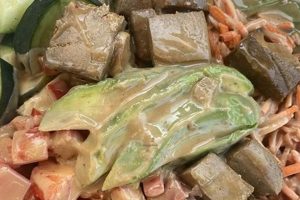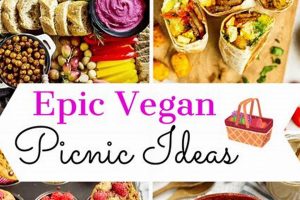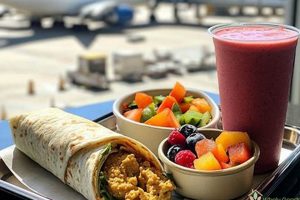Curated selections of plant-based consumables designed for gifting occasions represent a growing segment of the specialty food market. These collections typically include an assortment of non-animal-derived items such as gourmet snacks, artisanal condiments, sweets, and beverages. For instance, a recipient might find items like olive tapenade, handcrafted nut butter, dark chocolate, and herbal teas, all certified as meeting vegan dietary standards.
The increasing popularity of sending such presents reflects a broader societal shift toward plant-based diets and ethical consumerism. These offerings provide a convenient and thoughtful way to cater to individuals with specific dietary requirements or ethical preferences. Historically, specialized food hampers were often limited to traditional fare; however, the contemporary emphasis on inclusivity and health has fostered a demand for more diverse and considerate gifting options.
The subsequent sections will delve into the key considerations for selecting high-quality versions of these specialized food selections, including factors such as ingredient sourcing, ethical production practices, and presentation aesthetics. Furthermore, the article will explore the different types available and offer guidance on selecting the most appropriate choice for various recipients and occasions.
Selecting Optimal Vegan Food Gift Baskets
The following provides essential guidance for discerning consumers seeking to acquire appropriate vegan food presents. Careful consideration of the following aspects ensures satisfaction and suitability for the recipient.
Tip 1: Ingredient Transparency: Scrutinize the ingredient lists of all included items. Ensure explicit confirmation of plant-based origin and absence of animal-derived components such as honey, dairy, or gelatin.
Tip 2: Certification Verification: Prioritize products bearing recognized vegan certifications (e.g., Vegan Action, Vegan Society). These certifications offer independent assurance of adherence to strict vegan standards.
Tip 3: Ethical Sourcing Considerations: Inquire about the sourcing practices of the constituent products. Seek options that prioritize fair trade principles and sustainable agricultural methods.
Tip 4: Allergen Awareness: Carefully evaluate potential allergen concerns. Clearly identify any common allergens (e.g., nuts, soy, gluten) and confirm the recipient’s sensitivities.
Tip 5: Dietary Preferences Tailoring: Account for specific dietary restrictions or preferences beyond veganism, such as gluten-free, sugar-free, or low-sodium requirements.
Tip 6: Packaging Sustainability: Assess the environmental impact of the packaging materials. Opt for selections that utilize recyclable, biodegradable, or reusable containers.
Tip 7: Shelf Life Assessment: Confirm the shelf life of perishable items to ensure freshness upon receipt. Coordinate delivery timing accordingly to maximize enjoyment.
The proper selection of these vegan presents requires diligent attention to detail and commitment to ethical consumption. Adherence to these guidelines will result in a thoughtful and well-received gift.
The subsequent section will provide a detailed overview of prevalent misconceptions regarding plant-based diets and address concerns associated with nutritional adequacy.
1. Ingredients
The composition of vegan food gift baskets is fundamentally defined by the selection and quality of ingredients. These components directly dictate the basket’s appeal, nutritional value, and adherence to vegan principles. Therefore, a thorough understanding of ingredient-related aspects is crucial.
- Source Verification
The origin of each ingredient is paramount. Plant-based sources must be explicitly verified to ensure the absence of animal-derived products or byproducts. Examples include confirming that sugar is not processed using bone char or that oils are derived from plants, not animal fats. Transparency in sourcing information is critical for ethical consumerism.
- Nutritional Profile
The nutritional content of the basket is directly determined by its ingredients. Considerations include protein sources (legumes, nuts, seeds), healthy fats (avocados, oils), and essential vitamins and minerals. Balancing taste with nutritional value is essential, ensuring the basket offers both enjoyment and sustenance. For example, incorporating foods rich in Vitamin B12 is often considered, as this vitamin is not commonly found in plant-based diets.
- Allergen Awareness
Identification and labeling of potential allergens are critical for consumer safety. Common allergens include nuts, soy, gluten, and seeds. Clear labeling practices are essential to prevent adverse reactions. Substitute options for common allergens within a vegan context exist. For example, almond flour can be replaced with oat flour for individuals with nut allergies.
- Processing Methods
Processing methods can impact the vegan status and overall quality of ingredients. Minimally processed ingredients are generally preferred, as they retain more nutrients and reduce the risk of unintended animal product contamination. Furthermore, the use of artificial additives, preservatives, and colorings should be carefully considered and minimized.
In summary, the careful selection of ingredients is essential in determining the quality, ethical compliance, and overall appeal of vegan food gift baskets. Awareness of sourcing, nutritional content, potential allergens, and processing methods enables consumers to make informed choices that align with their values and dietary needs. These factors collectively contribute to a gift that is both enjoyable and responsibly sourced.
2. Certifications
Certifications play a crucial role in the vegan food gift basket market by providing assurance of adherence to specific dietary standards. The presence of recognized certifications enhances consumer trust and allows for informed purchasing decisions in a sector where ingredient transparency is paramount.
- Verification of Vegan Status
Certifications such as those provided by Vegan Action or The Vegan Society independently verify that products within a gift basket meet strict vegan criteria, excluding all animal-derived ingredients and byproducts. This verification process typically involves auditing ingredient lists, production methods, and supply chains to ensure compliance. Without such certification, consumers may face difficulty ascertaining the true vegan status of individual items.
- Reduction of Cross-Contamination Risk
Certified vegan products are often produced in facilities that implement measures to prevent cross-contamination with non-vegan ingredients. This is particularly important for individuals with strict dietary requirements or ethical concerns. Certifying bodies frequently conduct inspections to ensure that manufacturing processes minimize the risk of accidental inclusion of animal-derived substances.
- Enhanced Consumer Confidence
The presence of a recognized vegan certification mark on a product within a gift basket can significantly boost consumer confidence. This is because the certification serves as a visual cue that the product has been vetted by an independent organization, reducing the need for individual consumers to scrutinize lengthy ingredient lists or investigate manufacturing processes. The perceived reliability of certified products often translates to higher sales and increased customer loyalty.
- Standardization and Consistency
Certification bodies establish standardized criteria for vegan products, ensuring consistency across different brands and product types. This standardization simplifies the process of identifying suitable items for vegan food gift baskets and allows consumers to compare products based on a common set of standards. It also promotes accountability among manufacturers by requiring them to adhere to documented and verifiable procedures.
In conclusion, certifications provide a valuable mechanism for ensuring the integrity and reliability of vegan food gift baskets. By verifying vegan status, reducing cross-contamination risk, enhancing consumer confidence, and promoting standardization, certifications contribute to a more transparent and trustworthy market for plant-based products. The inclusion of certified products in gift baskets offers recipients assurance that their dietary and ethical preferences have been respected.
3. Ethical Sourcing
The concept of ethical sourcing within the context of plant-based food presents assumes significance far beyond mere compliance with vegan dietary restrictions. It encompasses a holistic evaluation of the supply chain, considering the environmental impact, labor practices, and community relationships associated with the production of each ingredient included in a vegan food present. A direct correlation exists between consumer expectations for vegan products and a demand for ethical business conduct. When assembling a vegan food present, a company’s or individual’s commitment to social responsibility is tested. Sourcing palm oil from sustainable plantations instead of those linked to deforestation exemplifies this principle. Similarly, procuring fair-trade coffee or chocolate ensures equitable compensation for farmers and workers in developing countries.
Practical applications of ethical sourcing within this market are multifaceted. Transparency regarding the origin of ingredients is essential, enabling consumers to make informed choices. Companies may choose to partner with suppliers who adhere to rigorous environmental standards, such as organic farming practices, or those who prioritize worker welfare, such as providing safe working conditions and fair wages. Third-party certifications, such as Fairtrade or Rainforest Alliance, offer verification of ethical sourcing practices and enhance credibility. Consider the example of a gift including cashews sourced from a supplier with a verifiable program to ensure workers receive fair compensation and are not subject to unsafe working conditions. This adds value to the gift that transcends its mere monetary cost.
In conclusion, ethical sourcing is not merely a desirable addendum to vegan food presents but an intrinsic component of their value proposition. Challenges remain in tracing complex supply chains and ensuring comprehensive adherence to ethical principles. However, the increasing consumer awareness of social and environmental issues underscores the importance of prioritizing ethical sourcing practices in the creation of these gifts. This practice ultimately aligns with the broader values of sustainability, social justice, and responsible consumption, contributing to a more equitable and environmentally sound food system.
4. Presentation
The visual arrangement of vegan food gift baskets exerts a substantial influence on the recipient’s perception and appreciation of the contents. A carefully curated presentation transcends mere functionality, transforming the collection of comestibles into a cohesive and appealing offering. The initial impression, formed through the arrangement, color palette, and packaging materials, directly impacts the perceived value and thoughtfulness of the gift. For instance, a basket featuring haphazardly arranged items in generic packaging may convey a lack of care, whereas a well-organized display within a visually striking container enhances the perceived quality and desirability of the included products. The presentation serves as a silent communicator, signaling the giver’s intent and level of consideration.
Furthermore, presentation can serve a practical purpose, optimizing the accessibility and preservation of the contained items. Thoughtful placement can protect delicate items during transit, preventing damage and maintaining their aesthetic appeal. The use of appropriate dividers and cushioning materials minimizes shifting and potential breakage. Consider the example of a basket containing fragile vegan cookies; securing these within individual compartments or cushioned wrapping ensures they arrive intact and visually appealing. Moreover, the selection of packaging materials can contribute to the overall sustainability of the gift. Recycled or biodegradable containers and fillers demonstrate a commitment to environmental responsibility, aligning with the values often associated with veganism.
In conclusion, presentation is an indispensable element of the vegan food gift basket experience, impacting both the immediate aesthetic appeal and the long-term satisfaction of the recipient. Investment in thoughtful arrangement, protective packaging, and sustainable materials elevates the gifting experience, transforming a collection of vegan foods into a memorable and meaningful gesture. Overlooking this crucial aspect diminishes the overall value and fails to fully capitalize on the potential of a well-chosen and ethically sourced selection of plant-based products. The attention to detail in presentation reflects the giver’s care and contributes significantly to the lasting impression of the gift.
5. Dietary Needs
The intrinsic connection between dietary needs and plant-based food selections is fundamental to the efficacy and appropriateness of these curated collections. Veganism, by definition, necessitates the exclusion of all animal-derived products, establishing a primary dietary constraint. However, the landscape of dietary requirements extends significantly beyond this initial exclusion. Consequently, careful consideration of individual requirements is paramount when assembling a vegan food offering, to ensure both safety and suitability.
The presence of allergies represents a critical consideration, wherein a food item deemed suitable under vegan standards may pose a severe health risk to the recipient. For instance, a collection containing nuts, soy, or gluten, while inherently plant-based, would be unsuitable for individuals with respective allergies. Beyond allergies, intolerances and sensitivities to certain ingredients, such as fructose or specific carbohydrates, must be acknowledged. Furthermore, medical conditions such as diabetes necessitate careful regulation of sugar and carbohydrate intake, influencing the selection of appropriate sweeteners and carbohydrate sources. Practical applications of this awareness include clear labeling of all ingredients and potential allergens, providing alternatives for common allergens, and offering customization options to accommodate specific dietary needs. A real-life example would be the option to create a personalized offering, selecting items from a pre-approved list of plant-based, allergy-free, and low-sugar items.
The consideration of individual dietary needs represents an ethical imperative when assembling a vegan food selection. Failing to acknowledge these needs can result in adverse health consequences and diminishes the perceived thoughtfulness of the gift. While challenges may arise in accommodating highly specific or complex dietary restrictions, the effort to address these concerns demonstrates a commitment to inclusivity and responsible consumption. Ultimately, understanding and catering to individual dietary needs is integral to ensuring that vegan food offerings are both safe and appreciated, fostering a positive and inclusive gifting experience.
6. Shelf Life
The duration for which individual components within plant-based presents maintain their optimal quality and safety dictates the overall suitability of the offering. Insufficient product longevity introduces the risk of spoilage, compromising taste, texture, and nutritional value, potentially leading to foodborne illness. Short lifespans necessitate rapid consumption, which may be impractical for recipients. The inclusion of perishable items, such as fresh produce or unpreserved baked goods, inherently limits the timeframe during which the gift remains viable. Conversely, items with extended durability, like dried fruits, nuts, or shelf-stable condiments, contribute to a more enduring and convenient presentation. Example: A basket comprised of fresh fruit, artisan bread, and homemade dips possesses a markedly shorter useful duration compared to a collection of dried legumes, sealed nut butters, and packaged vegan crackers.
Effective management of this factor involves careful selection of ingredients and meticulous attention to storage and packaging techniques. packaging, modified atmosphere packaging, and the inclusion of desiccants can extend the shelf life of specific items. Accurate labeling of expiration or “best by” dates is paramount, providing recipients with clear guidance on consumption timelines. Consideration should be given to the transport and storage conditions throughout the distribution process. Elevated temperatures or exposure to direct sunlight can accelerate spoilage, regardless of the inherent stability of individual components. Example: A manufacturer might opt for vacuum-sealed pouches for dried fruits to prevent oxidation and moisture absorption, thereby prolonging their suitability for inclusion in the gift.
In summation, the consideration of shelf life is a critical determinant of the quality and practicality of plant-based presents. Strategic selection of durable ingredients, coupled with appropriate preservation and packaging methods, maximizes the longevity of the offering, ensuring a positive recipient experience. Neglecting this fundamental aspect diminishes the value of the presentation and introduces potential risks related to food safety and quality. Thoughtful attention to this element aligns with the broader principles of responsible consumption and conscientious gifting.
7. Packaging
The encasement and presentation of vegan food gift baskets constitute a critical element influencing both the recipient’s initial impression and the environmental impact of the offering. Packaging decisions necessitate careful consideration of materials, functionality, and aesthetic appeal to align with the values often associated with veganism.
- Material Sustainability
The selection of packaging materials bears direct implications for environmental sustainability. Recycled cardboard, biodegradable plastics, and plant-based compostable materials represent alternatives to conventional plastics. Employing such materials reduces reliance on fossil fuels and minimizes landfill waste. Example: Replacing plastic bubble wrap with recycled paper cushioning or utilizing a basket constructed from sustainably harvested bamboo aligns with eco-conscious consumer values.
- Product Protection
Packaging serves a fundamental role in safeguarding the integrity of the contained food items during transit and storage. Adequate protection prevents damage, spoilage, and contamination. Protective measures may include specialized inserts, cushioning materials, and airtight seals. Example: Securing delicate vegan cookies within individual compartments or using a vacuum-sealed bag for nuts prevents breakage and maintains freshness.
- Informational Clarity
The exterior of the packaging provides a valuable surface for conveying essential information to the recipient. This includes ingredient lists, allergen warnings, expiration dates, and nutritional information. Clear and accurate labeling is crucial for ensuring consumer safety and informed decision-making. Example: Displaying a prominent vegan certification logo and a complete list of ingredients in a legible font ensures compliance and transparency.
- Aesthetic Presentation
The visual appeal of the packaging contributes significantly to the overall perception of the gift. Thoughtful design elements, such as color palettes, typography, and arrangement, enhance the perceived value and desirability of the contents. A well-designed package communicates care and attention to detail. Example: Utilizing a minimalist design with natural color tones and elegant typography can convey a sense of sophistication and align with the ethos of mindful consumption.
The thoughtful integration of sustainable materials, protective features, clear labeling, and appealing design elevates the overall quality of vegan food gift baskets. Packaging transcends its functional role, serving as a communicator of values and a contributor to the overall gifting experience. Balancing environmental responsibility with practical considerations is essential to creating a successful and well-received offering.
Frequently Asked Questions
The following section addresses prevalent inquiries regarding the selection, composition, and suitability of vegan food presents. The information provided aims to clarify common concerns and misconceptions.
Question 1: What constitutes a “vegan” food offering, and how does it differ from other dietary-restricted presents?
A vegan food selection strictly excludes all animal-derived ingredients and byproducts. This encompasses not only meat, poultry, fish, and dairy but also other components such as honey, gelatin, and certain additives derived from animal sources. It distinguishes itself from vegetarian presents, which may contain dairy or eggs, and from other specialized collections, which may focus on gluten-free or sugar-free requirements without adhering to the broader ethical considerations of veganism.
Question 2: How can one verify the “vegan” status of items included in a gift basket?
Verification involves a multi-faceted approach. Scrutinizing ingredient lists for any animal-derived components is essential. Seeking products bearing recognized vegan certifications, such as those issued by Vegan Action or The Vegan Society, provides additional assurance. Contacting manufacturers directly to inquire about sourcing and production methods can further validate the vegan status of individual items.
Question 3: What are the common nutritional considerations when selecting ingredients for a vegan food selection?
Ensuring adequate protein intake is paramount. Legumes, nuts, seeds, and tofu represent valuable sources. Addressing potential deficiencies in vitamins B12 and D, which are not commonly found in plant-based diets, is also crucial. The inclusion of fortified foods or supplements may be necessary to meet these nutritional requirements.
Question 4: What are the ethical considerations beyond dietary restrictions that should be considered when sourcing items?
Ethical sourcing encompasses fair labor practices, environmental sustainability, and animal welfare. Prioritizing fair-trade certified products ensures equitable compensation for farmers and workers. Opting for organically grown ingredients minimizes exposure to pesticides and supports biodiversity. Avoiding products linked to deforestation or habitat destruction aligns with broader environmental concerns.
Question 5: How does packaging contribute to the overall quality and sustainability of a vegan food selection?
Sustainable packaging minimizes environmental impact by utilizing recycled, biodegradable, or compostable materials. It reduces reliance on fossil fuels and minimizes landfill waste. Protective packaging safeguards the integrity of the contained food items during transit and storage. Clear labeling provides essential information to the recipient.
Question 6: What are the common misconceptions associated with vegan food gifts?
One common misconception is that vegan food options are inherently limited or unappetizing. In reality, a wide array of plant-based ingredients and innovative recipes offer diverse and flavorful culinary experiences. Another misconception is that veganism is prohibitively expensive. While certain specialty items may command a premium, many affordable and nutritious plant-based staples, such as beans, lentils, and grains, can form the basis of a satisfying and budget-friendly selection.
In summary, selecting an appropriate vegan food present requires careful attention to dietary restrictions, nutritional considerations, ethical sourcing, packaging sustainability, and the dispelling of common misconceptions. Informed choices will contribute to a thoughtful and well-received gift.
The subsequent section will offer practical tips for assembling a personalized vegan food offering, tailored to specific recipient preferences and occasions.
Conclusion
The preceding discourse has illuminated the multifaceted considerations inherent in the selection and composition of plant-based comestibles. A comprehensive understanding of dietary restrictions, ethical sourcing, packaging implications, and nutritional adequacy is critical to the successful deployment of these specialized food collections. Such knowledge permits the creation of offerings that are both aesthetically pleasing and ethically sound.
The proliferation of veganism as a dietary and ethical paradigm necessitates a shift in consumer awareness and purchasing habits. The informed selection of these plant-based presents represents a tangible step toward fostering a more sustainable and compassionate food system. Continued diligence in sourcing, preparation, and presentation will ensure the enduring value and relevance of these thoughtful offerings.







